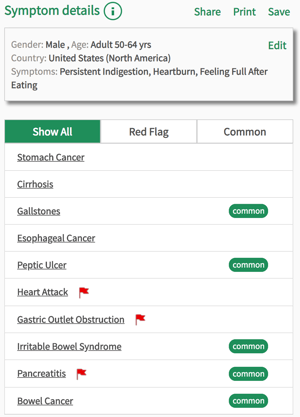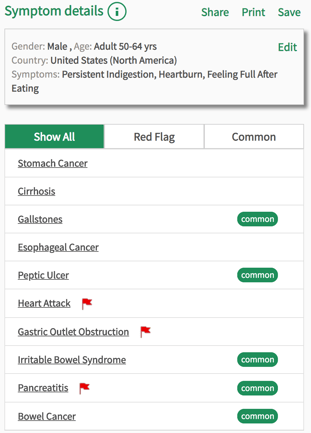- Privacy Policy
- Terms & Conditions
- Contact us
- ©Isabel Healthcare 2020
Stomach cancer: Symptoms, causes and diagnosis - Isabel Healthcare
 Take a look at the stats for Stomach Cancer, also known as Gastric Cancer, and you’ll realise it’s not an easy one to diagnose. Out of an estimated 28,000 cases in the US each year, nearly a third, 10,960, are expected to die. The figures in the UK are even worse with only 15% of patients expected to live beyond 10 years. The real clue lies in the fact that nearly a third of British patients first present with the illness in their emergency or A&E department, and given that the typical initial symptoms such as indigestion, wind or heartburn aren’t exactly emergency symptoms, this implies that most patients are experiencing a substantial and often fatal delay in getting a diagnosis. As stomach cancer symptoms are often easily mistaken for less serious conditions, it’s understandable that both patient and doctor won’t suspect a potentially fatal cancer as the cause. Which is why we’ve devoted this week’s blog to discussing the symptoms and when to seek advice, in the hopes we can help sufferers present much earlier to their doctor and consequently find a cure.
Take a look at the stats for Stomach Cancer, also known as Gastric Cancer, and you’ll realise it’s not an easy one to diagnose. Out of an estimated 28,000 cases in the US each year, nearly a third, 10,960, are expected to die. The figures in the UK are even worse with only 15% of patients expected to live beyond 10 years. The real clue lies in the fact that nearly a third of British patients first present with the illness in their emergency or A&E department, and given that the typical initial symptoms such as indigestion, wind or heartburn aren’t exactly emergency symptoms, this implies that most patients are experiencing a substantial and often fatal delay in getting a diagnosis. As stomach cancer symptoms are often easily mistaken for less serious conditions, it’s understandable that both patient and doctor won’t suspect a potentially fatal cancer as the cause. Which is why we’ve devoted this week’s blog to discussing the symptoms and when to seek advice, in the hopes we can help sufferers present much earlier to their doctor and consequently find a cure.
What is stomach cancer?
Stomach cancer is the 5th most common cancer worldwide and, due to its frequently late diagnosis, the 3rd most deadly. It occurs when abnormal cells in the stomach’s lining start growing uncontrollably, leading to the formation of a tumor. The stomach wall is made up of 5 layers of tissue and it’s in the innermost layer, the mucosa, that the cancer will start growing, spreading outwards as time passes. Left untreated, the cancer starts to spread to other parts of the body, usually via the lymphatic system.
Who’s at risk of stomach cancer?
In the vast majority of cases, stomach cancer is linked to lifestyle factors, which may explain why it rarely affects the young. 95% of cases occur in the over 55’s and men are twice as likely to develop the condition but these lifestyle choices also play a huge part:
- Smoking. Smokers are twice as likely to develop the disease, as inhaled smoke can end up in the stomach, which in turn damages the stomach cells
- Diet. Countries with a diet rich in pickled vegetables, salted fish and smoked meats have a higher incidence of stomach cancer. If this sounds familiar, try to add more fibre and more fresh fruit and veg to your diet. According to Cancer Research UK, high salt intake is a particularly grave risk factor for stomach cancer. If you think you’re having more than the recommended 6g of salt a day, which is around a teaspoon, try to cut down. Bear in mind though that most of our salt intake is already in everyday foods such as bread, cereals and ready meals
- Family history. It’s not clear whether this is genetic or down more to shared lifestyles
- Previous cancer sufferers. Sadly previous cancer patients have an increased risk of developing the disease
- Certain medical conditions. Examples include patients with pernicious anaemia (B12 deficiency) and those suffering from peptic ulcers or helicobacter pylori infections
Symptoms of stomach cancer

As we mentioned earlier, it is critical to recognise the early symptoms and stop the cancer in its tracks as soon as possible. The trouble is, early symptoms are often confused with less serious conditions such as stomach ulcers. if you’re suffering from any of the symptoms below, enter them into the Isabel Symptom Checker and research their causes as much as possible before discussing them with your doctor:
- Persistent indigestion, known medically as dyspepsia
- Trapped wind and frequent burping
- Heartburn
- Feeling full quickly when eating
- Nausea
- Difficulty swallowing, also known as dysphagia. You might feel a burning sensation or food might stick in your throat
- Unexplained weight loss. This is a key cancer symptom and should always be reported to your doctor.
Rest assured that these are all common symptoms for many conditions and not usually caused by cancer, but if you’ve been suffering from them most days and for more than 3 weeks, it’s time to talk to your doctor.
More advanced symptoms of the disease can include:
- Blood in your stool or black, tar-like stool
- Blood in your vomit
- Loss of appetite
- Tiredness
- Swelling in your stomach
- Anemia, read our blogpost on anemia here
- Jaundice, a yellowing of the skin and the whites of the eyes
Stomach cancer can also be mistakenly diagnosed as irritable bowel syndrome (IBS), celiac disease or inflammatory bowl disease (IBD), so if you’re being treated for these illnesses and your condition isn’t improving, suggest a possible investigation of stomach cancer to your doctor.
How is stomach cancer diagnosed?
If your doctor suspects stomach cancer, they will refer you to a specialist who is likely to arrange an endoscopy, which is a long, light tube with a camera on the end. It is inserted down your throat into your stomach to look for stomach ulcers and cancer. If cancer is detected, a biopsy, a small tissue sample, will be taken during the same procedure. If cancer is finally diagnosed, you may need further tests to ascertain how far the disease has spread and could be referred for a scan, which will reveal if any tumors have developed elsewhere. These procedures will all help to determine what sort of treatment you need. If you are diagnosed with cancer this can be a very complex process with a lot of overwhelming information. We’ve written a blogpost on both cancer treatments and cancer types and stages, these might help you understand when these conversations are had.
How is stomach cancer treated?
Treatments will entirely depend on your overall health and how far the cancer has spread. Treatment options are surgery, chemotherapy and chemoradiation and are determined by what stage your cancer is at when diagnosed, you may receive surgery alone or a combination of these treatments. Often if your tumor is stage 1B upwards at diagnosis then chemotherapy or chemoradiation may be given before surgery in order to shrink the cancer and make it easier to remove.
As this blog has hopefully made clear, it’s essential that we don’t ignore the early warning signs our body is giving us of stomach cancer, or any condition of the stomach. If you’re experiencing any of these symptoms, it’s hopefully something much less serious, but taking a few minutes to research them on the Isabel Symptom Checker and discussing the results with your doctor is a great next step.
Subscribe Here!
Recent Posts
Virtual Triage: Do more questions lead to better patient outcomes?
One of the common misconceptions related to virtual triage / symptom checker tools is that the more..Webinar: Using Virtual Triage To Transform Patient Access
Outdated contact centers are posing problems for today's health systems. As longer hold times..List Of Categories
- Differential Diagnosis Decision Support
- Differential diagnosis
- Symptom Checker
- Symptoms
- Medical Error
- Patient Disease Information
- Disease
- Diagnostic Decision Support
- Clinical Decision Support
- Isabel 1 Minute Read
- Diagnosis Error
- Diagnosis Skills Cases
- Healthcare Informatics
- Medical Education
- Patient Engagement
- Clinical Reasoning
- Evidence-based Medicine
- Symptom Triage
- Nurse Practitioner Education
- Nursing Decision Support
- Partnership
- Public Health
- COVID-19
- EHR
- Patient Empowerment
- Patient Safety
- rare disease

Start your FREE Trial today
Try the Isabel Pro DDx generator for 30-days - no payment card details required.




